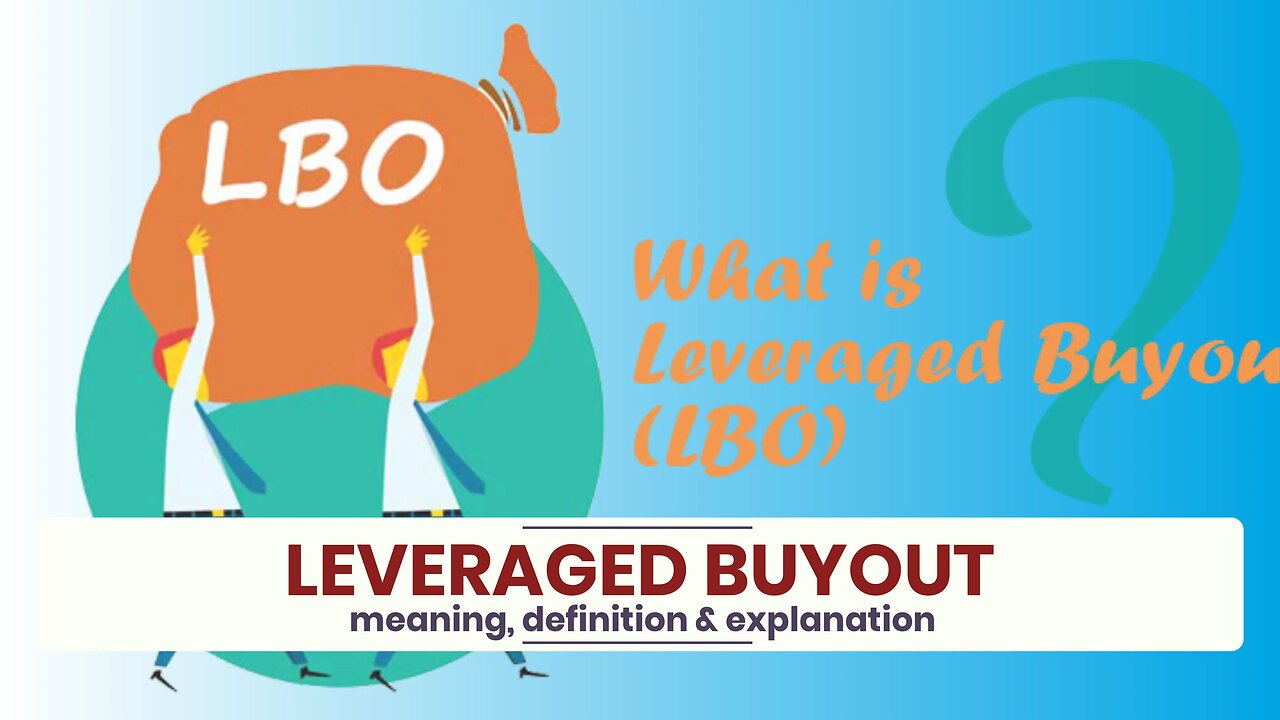Premium Only Content

What is LEVERAGED BUYOUT?
✪✪✪✪✪
http://www.theaudiopedia.com
✪✪✪✪✪
What does LEVERAGED BUYOUT mean? LEVERAGED BUYOUT meaning - LEVERAGED BUYOUT definition - LEVERAGED BUYOUT explanation. What is the meaning of LEVERAGED BUYOUT? What is the definition of LEVERAGED BUYOUT? What does LEVERAGED BUYOUT stand for? What is LEVERAGED BUYOUT meaning? What is LEVERAGED BUYOUT definition?
A leveraged buyout (LBO) is a transaction when a company or single asset (e.g., a real estate property) is purchased with a combination of equity and significant amounts of borrowed money, structured in such a way that the target's cash flows or assets are used as the collateral (or "leverage") to secure and repay the borrowed money. Since the debt (be it senior or mezzanine) has a lower cost of capital than the equity, the returns on the equity increase as the amount of borrowed money does until the perfect capital structure is reached. As a result, the debt effectively serves as a lever to increase returns-on-investment.
The term LBO is usually employed when a financial sponsor acquires a company. However, many corporate transactions are partially funded by bank debt, thus effectively also representing an LBO. LBOs can have many different forms such as management buyout (MBO), management buy-in (MBI), secondary buyout and tertiary buyout, among others, and can occur in growth situations, restructuring situations, and insolvencies. LBOs mostly occur in private companies, but can also be employed with public companies (in a so-called PtP transaction – Public to Private).
As financial sponsors increase their returns by employing a very high leverage (i.e., a high ratio of debt to equity), they have an incentive to employ as much debt as possible to finance an acquisition. This has, in many cases, led to situations in which companies were "over-leveraged", meaning that they did not generate sufficient cash flows to service their debt, which in turn led to insolvency or to debt-to-equity swaps in which the equity owners lose control over the business to the lenders.
-
 2:28
2:28
The Audiopedia
10 months agoWhat is MORTGAGE BROKER?
22 -
 LIVE
LIVE
Anthony Rogers
1 day agoEpisode 364 - JFK FILES
44 watching -
 LIVE
LIVE
megimu32
2 hours agoON THE SUBJECT: 1 Million Views Party! Diddy Drama, Marvel Weirdness, and Total Prom Chaos
210 watching -
 1:18:44
1:18:44
Kim Iversen
5 hours agoMagnetic Pole Shift: Europe’s Blackout Is Just the Beginning | 90° Earth Flip Coming
89.8K203 -
 2:44:58
2:44:58
Laura Loomer
4 hours agoEP118: LIVE COVERAGE: Trump Celebrates 100 Days In Office At Michigan Rally
59.4K25 -
 3:40:42
3:40:42
Barry Cunningham
11 hours agoWATCH TRUMP RALLY LIVE: PRESIDENT TRUMP MARKS 100 DAYS IN OFFICE WITH A RALLY IN MICHIGAN
44.2K13 -
 1:32:44
1:32:44
Badlands Media
11 hours agoBadlands Media Special Coverage: President Trump's 1st 100 Days Rally
52.4K2 -
 LIVE
LIVE
RalliedLIVE
6 hours ago $0.88 earnedWarzone All Night w/ Ral
70 watching -
 49:12
49:12
Sarah Westall
4 hours agoA Globalist Agenda or Chinese Payback? Fentanyl #1 Cause of Death for People Under 49
28.7K5 -
 55:30
55:30
LFA TV
1 day ago| TRUMPET DAILY 4.29.25 7PM
20.9K1